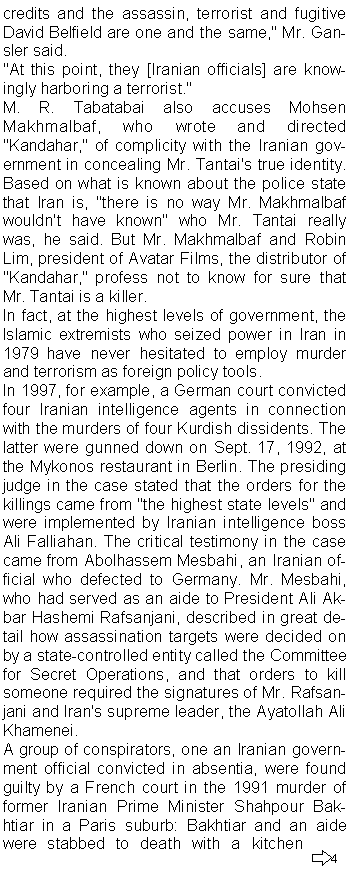|
The Washington Times
Editorial
January 7, 2002
On July 22, 1980, David Belfield, a former Howard University student posing as a mailman, walked up to Ali Akbar Tabatabai, a former Iranian diplomat who had served under Shah Mohammed Reza Pahlevi, and shot him to death as he stood on the doorstep of his Bethesda home.
U.S. law enforcement officials say that after the killing, Belfield, who had recently converted to Islam, fled to Iran, where the Ayatollah Khomeini's brutal regime gave him refuge.
In a 1996 interview broadcast by ABC, Belfield, who had taken the name Daoud Salahuddin, confessed to the murder and brazenly said that Tabatabai (who had been perhaps the most eloquent U.S.-based critic of Khomeinism) deserved to die. "All governments kill traitors, and all governments, if they can, kill people who are making strong attempts to overthrow them," said Belfield.
Asked if he regretted his action, Belfield replied that "no, I never lost any sleep over that incident."
In fact, it appears that Belfield has done very well for himself since moving to Iran two decades ago. As Joyce Howard Price first reported in The Washington Times Dec. 20, Belfield may have metamorphosed into an internationally renowned actor who calls himself "Hassan Tantai." If the name sounds familiar, it may be because Mr. Tantai is listed as the star of a popular Iranian-made movie called "Kandahar." M. R. Tabatabai, the twin brother of the slain diplomat, concluded that, after viewing Mr. Tantai's performance in "Kandahar," Mr. Tantai is actually Belfield.
Montgomery County State's Attorney Douglas Gansler, whose office stands ready to prosecute Belfield for killing Ali Akbar Tabatabai, said in an interview Thursday with The Washington Times that Belfield and Mr. Tantai are the same man. "It's crystal clear that the actor listed in the
|
|
